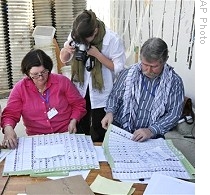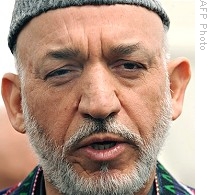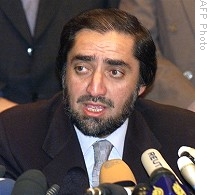Islamabad
07 October 2009
 |
| Electoral Complaints Commission (ECC) worker takes photograph after looking for patterns of irregularities in Kabul, 13 Sep 2009 |
The Washington Post reported voter turnout information allegedly kept secret by the chief envoy for the United Nations in Afghanistan, Kai Eide, provides further evidence the August 20 contest was marred by fraud.
The information the newspaper obtained reportedly shows widespread discrepancies between the estimated voter turnout and the results reported by the country's Independent Election Commission.
U.N. spokesman in Kabul Dan McNorton, speaking by phone to VOA, says it is early to make any conclusions based on the data.
"It is unsubstantiated raw data and should be treated as such," he said.
 |
| Afghan President Hamid Karzai (file photo) |
One example is in the country's southern province of Helmand, where the Independent Election Commission recorded roughly 135,000 votes, but the United Nations estimated between 5,000 and 38,000 people actually voted.
The U.N. data also reportedly shows fraud in favor of candidate Abdullah Abdullah, but on a much smaller scale.
Allegations of rampant fraud and vote-rigging have surrounded the Afghan presidential election and raised questions about its legitimacy.
 |
| Abdullah Abdullah (File photo) |
Last week, U.N. Secretary-General Ban Ki-moon removed Kai Eide's deputy, U.S. diplomat Peter Galbraith, from his post after Galbraith accused his boss of failing to provide Afghan and international officials with evidence of fraud, primarily by Mr. Karzai's supporters. Mr. Karzai's chief rival, Abdullah Abdullah, also has questioned the United Nations' role in the election.
McNorton dismisses the allegations, saying election officials are thoroughly investigating all instances of alleged fraud.
"To suggest that the United Nations in Afghanistan has supported one particular candidate over another is ludicrous," he said.
Afghan election officials say workers are recounting some of the ballots from the presidential election and expect to formally declare a winner by late next week.
While the political uncertainty has prevailed since the August 20 poll, the Taliban-led insurgency continues to undermine international efforts to bring stability to Afghanistan eight years after the U.S.-led coalition launched the anti-Taliban offensive.